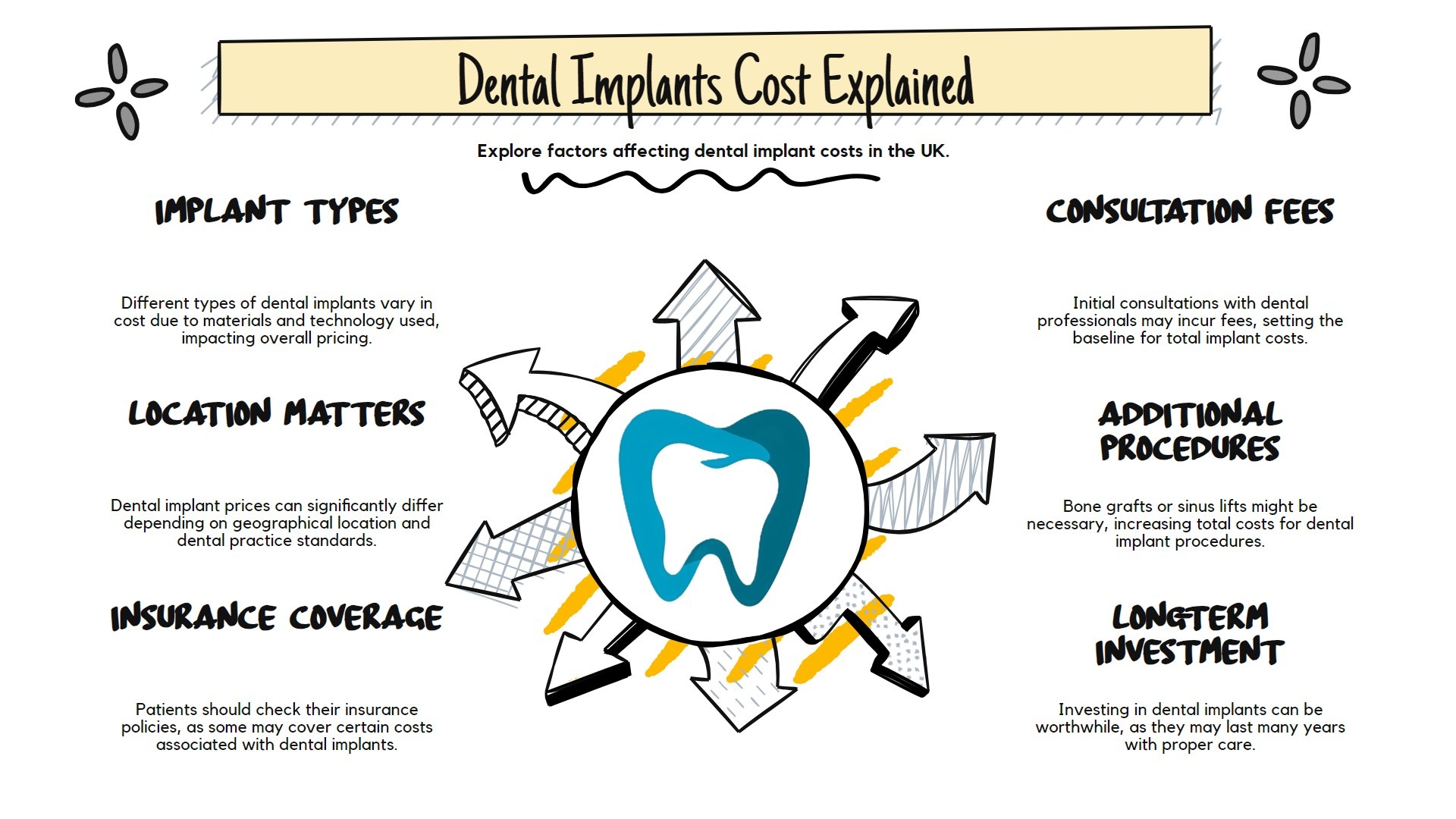Dental implants provide a reliable option for replacing missing teeth while offering stability and a natural appearance. For many considering dental implants in the UK, knowing what to expect in terms of price is crucial. This guide outlines the main cost factors, typical price ranges, and offers practical advice for managing expenses while achieving a healthy smile.

The Price Breakdown
Dental implants usually consist of several components. A typical procedure involves the implant itself (a titanium post inserted into the jawbone), the abutment (a connector), and the crown (the visible replacement tooth). Each step carries its own cost, which may vary based on several factors.
Consultation and Diagnosis: The initial appointment includes examinations, X-rays, or 3D scans to assess bone density and structure. Clinics charge for these preliminary tests to ensure the procedure is safe and appropriate.
Implant Surgery: This cost covers the placement of the titanium post. Prices may differ based on the implant type and the clinic’s expertise.
Abutment and Crown: The abutment is attached to the implant and acts as a base for the crown. The crown, which replicates the natural tooth, is typically custom-made. The quality of materials used, such as porcelain or zirconia, will affect the overall expense.
Follow-Up Appointments: Post-surgery visits help monitor healing and ensure proper integration of the implant with the jawbone.
Factors That Influence Implant Pricing
Various factors influence the overall cost of dental implants in the UK. Understanding these aspects can help patients compare quotes and choose the best provider for their needs.
Clinic Location: Prices may differ depending on the region. Urban areas with higher overheads tend to have higher fees compared to rural practices.
Dentist’s Experience: Clinics with a long history of successful implant surgeries often charge higher fees. The dentist’s expertise and reputation play an important role in pricing.
Materials and Technology: High-quality materials and modern technology, such as digital imaging and guided implant surgery, may increase costs but can lead to better outcomes and longer-lasting results.
Number of Implants: A single implant procedure will cost less than multiple implants or a full-mouth restoration. Each additional implant adds to the overall price.
Additional Treatments: Bone grafting or sinus lifts might be necessary if the jawbone does not have sufficient volume to support an implant. These procedures incur extra fees.
Money-Saving Advice for Dental Implants
Many patients worry about the financial implications of dental implants. There are ways to manage costs without compromising the quality of treatment.
Compare Providers: Look at several clinics and compare their prices, services, and patient reviews. Asking for detailed quotes helps identify hidden fees.
Financing Options: Some dental practices offer payment plans or financing options, making it easier to budget for the procedure over time.
Insurance and Discounts: Check if your dental insurance covers part of the cost or if there are seasonal promotions. Some clinics offer special rates for multiple implants.
Ask Questions: When meeting with your dentist, inquire about the rationale behind the proposed treatment plan and the materials being used. Clear communication can help avoid unexpected costs.
Consider Long-Term Value: While the upfront cost may seem high, dental implants are an investment in oral health. They can last for many years with proper care, reducing the need for future procedures.
Planning Your Investment in a Healthy Smile
It is essential to consider both immediate expenses and long-term benefits. Dental implants help maintain bone structure, prevent the shifting of surrounding teeth, and improve overall oral function. For many, this leads to improved confidence and quality of life.
Patients should set aside time to ask detailed questions during consultations. Look for clinics that explain every step of the process clearly. A transparent provider will discuss each cost element and explain why certain procedures may be necessary. Taking the time to review multiple options helps in understanding the pricing and ensures that the chosen treatment aligns with both financial and health goals.
Clinics offering a comprehensive service may provide bundled packages. These packages cover consultations, surgery, and follow-up appointments at one set price, which can sometimes be more affordable than paying for each service individually. It is worth inquiring if such options are available.
Frequently Asked Questions
Q1: What is the average cost of a single dental implant in the UK?
A single implant typically ranges from £1,500 to £2,500 for the surgical procedure. This does not include additional costs for abutments and crowns, which can add another £500 to £1,500.
Q2: Are there any hidden fees I should be aware of?
Some clinics charge separately for consultations, imaging, and follow-up care. Always ask for a detailed quote that outlines all potential costs before starting treatment.
Q3: How does the cost vary between private and NHS treatments?
Dental implants are generally not available under the NHS. Private treatment fees vary based on the dentist’s expertise, clinic location, and the materials used.
Q4: Can dental insurance help cover the cost of implants?
Many dental insurance policies do not cover implants as they are often considered elective procedures. It is important to check with your provider about what, if any, coverage is available.
Q5: What financing options are available?
Many clinics offer installment plans or third-party financing. Some providers work with finance companies that specialize in healthcare expenses, making it easier to manage the cost over time.
Key Takeaways
Clear Pricing Structure: Ensure every cost element is explained during the consultation, including imaging, surgery, abutment, crown, and follow-up appointments.
Comparison Shopping: Evaluate multiple clinics to understand regional price differences and find the best value for your needs.
Quality Materials Matter: Using high-quality materials may increase the upfront cost but can result in better longevity and improved outcomes.
Budgeting Assistance: Explore financing plans or bundled packages that can make the overall expense more manageable.
Ask for Detailed Quotes: Request a complete breakdown of costs to avoid unexpected fees during the treatment process.
Final Thoughts
Deciding on dental implants is a major step toward restoring oral function and appearance. Being well-prepared with knowledge about the price components and cost factors helps in planning your investment in long-term oral health. Dental implants have the potential to enhance quality of life, making it worthwhile to consider all aspects of the expense carefully.
Maintaining open communication with your chosen provider and understanding the details of your treatment plan can provide clarity and peace of mind. A thorough review of all financial aspects, combined with a focus on quality care, lays a solid foundation for a healthier smile and improved dental wellness.
 Add Row
Add Row  Add
Add 




 Add Row
Add Row  Add
Add 


Write A Comment